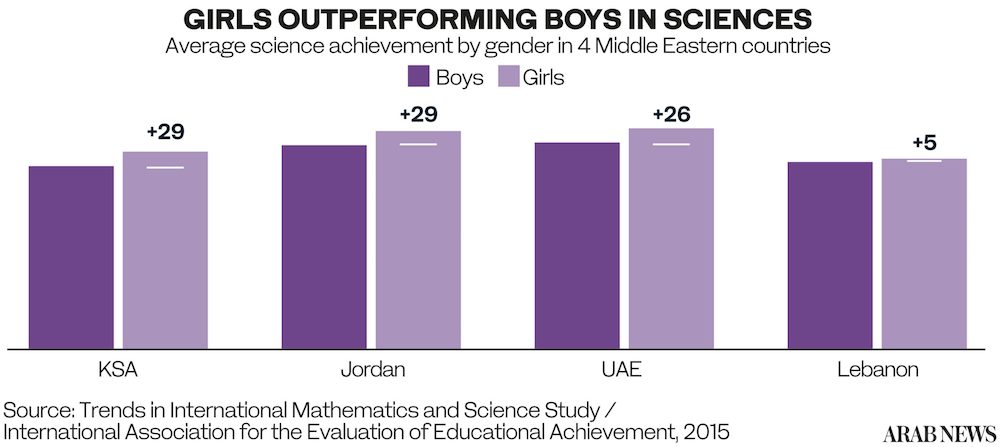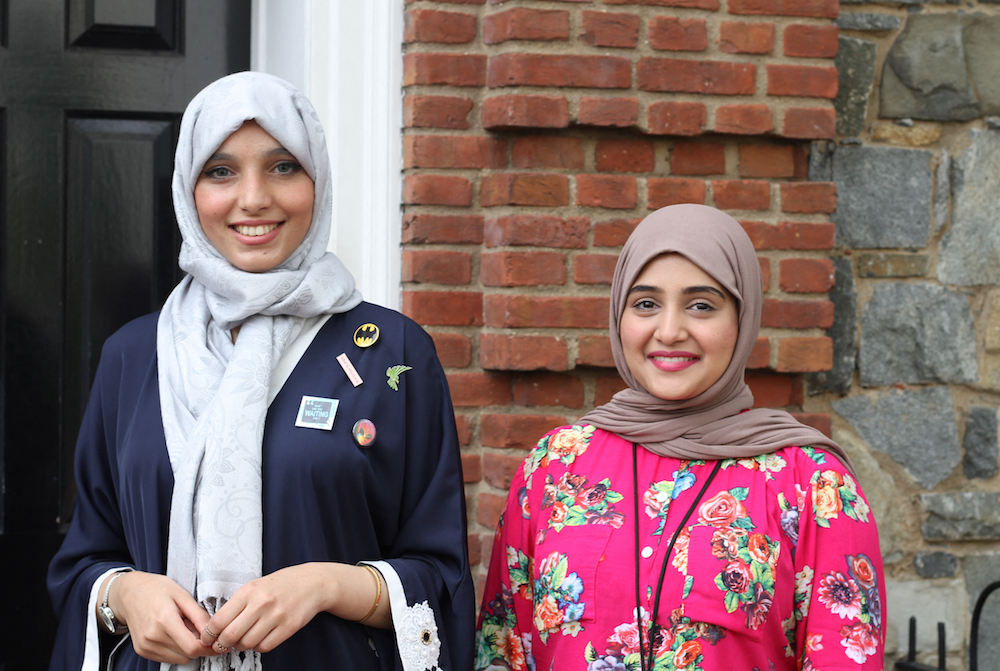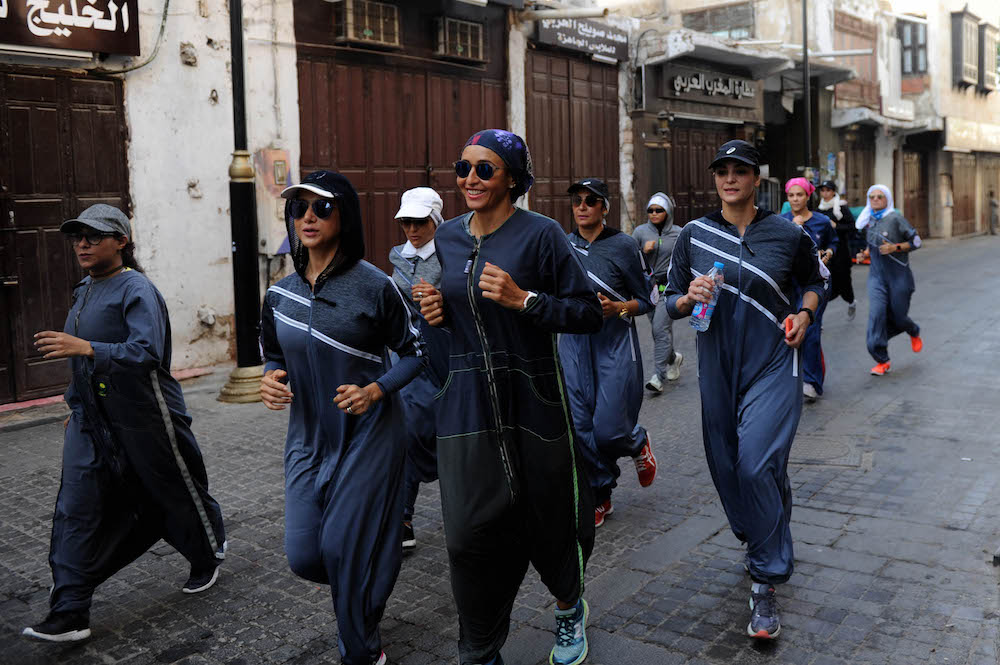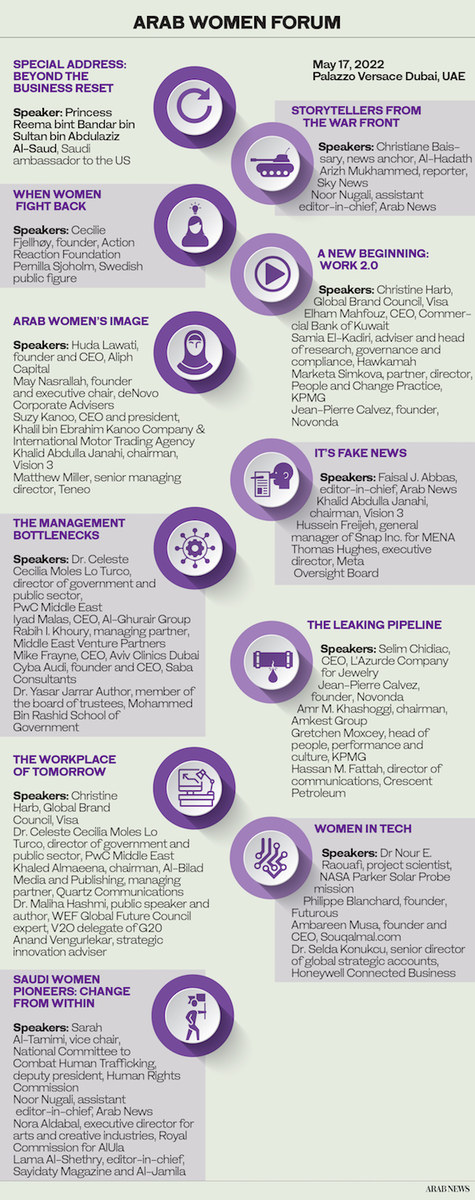DUBAI: Outdated and harmful stereotypes of meek and oppressed Arab women still prevail in Western and Asian media.
Despite these faulty notions about who and what they are, Arab women continue to defy expectations and make inroads in the worlds of business, politics, finance, diplomacy and tech.
However, many believe more must still be done to tackle baseless misconceptions about Arab women, their role and their capabilities in the eyes of the outside world.
“We live in a world which has historically looked at our part of the world as a traditional one, where women are more in the family and household,” May Nasrallah, founder and executive chairman of deNovo Corporate Advisers, told Arab News.

A Saudi woman poses for a photo after having a driving lesson in Jeddah on March 7, 2018. (AFP/File Photo)
“But in reality, we are so far away from that (in terms of) the evolution and how much we’ve changed in how we operate here. In the UAE, we have women in government, leadership positions, heads of banks, family groups and ministers, so we’ve changed a lot, but there is a lack of knowledge.”
To change the image of the Arab woman abroad, Nasrallah has urged traditional forms of media, such as television broadcasters, to showcase more female Arab leaders.
“We see multiple examples where they are very impressive,” she said. “It’s about continuing to escalate women to let the world see what they are capable of.”
Another potential area of improvement is in challenging gender expectations that persist within some communities.

Nasrallah and Kanoo were part of a discussion panel on “Arab women’s image,” which took place at the Arab Women’s Forum within the Top CEO conference in Dubai on May 17. (AN Photo/Zubiya Shaikh)
“We need our own traditional images to change internally,” Nasrallah said. “It changes with the different generations and we’re getting there. Look at the leadership around us, and who is running our region right now. It is very forward-thinking, very open minded, and it enhances women in leadership positions. It’s been reflected time and again.”
Nasrallah believes self-doubt is another obstacle that needs to be overcome in the mindsets of Arab women. Recalling her own time in investment banking, she remembers male colleagues putting themselves forward for promotions or new roles — whether they were capable of them or not.
“Women, on the other hand, second guess themselves and that’s inherent in our configuration, which needs to be changed,” she said.
A support network at home is also crucial. Nasrallah, who has four sons, said that she drew encouragement from both her father and husband, who pushed her to maintain her full-time career.

“Having men around us that encourage us to continue to go forth in the business world or workforce is a huge positive.”
Equally, providing the right tools to be successful and to not be afraid to fail would give more women the mentality required to succeed. Having a supportive network of peers would also provide an important ecosystem that can help support them in entrepreneurship.
For Suzy Kanoo, CEO and president of the Khalil bin Ebrahim Kanoo Company and International Motor Trading Agency in Bahrain, raising awareness about the successes of Arab women is key.
“We talk about how great we are, but women underestimate their strength — it’s unequaled,” she told Arab News.

Saudi entrepreneurs Asmaa Alabdallah (L), founder of BitGo, and Reem Dad (R), co-founder of Taibah VR, stand in front of Halcyon House in Washington. (AFP)
“In my family business, I attend conferences around the Asian continent, and I have noticed they preferred to talk to the male manager, which hit me, and I realized I am blessed to be a part of this region and I am so proud to be an Arab woman.”
Kanoo, who wrote a book about empowering Arab women called “Hear Us Speak: Letters from Arab Women,” said the West fails fundamentally to understand Arab women and their religion.
“(For the West), being more modest or wearing a hijab has something to do with a woman being more submissive,” she said.
“(For them) it’s synonymous with that, but when they come here, they see it’s not true at all. This is a choice that everyone has the right to, but I’m respected the same way as someone who wears one and this is the beauty of our region.”

Making an effort to understand, visit and read more about the region would help eliminate such misconceptions, she believes, as foreigners would come to realize that the ideas they have been fed about the role and status of Arab women is false.
However, Kanoo believes an issue arises when Arab women seek to move up the professional ladder.
“I see that lacking,” she said. “We need more action, with more women on board seats. We’re just as educated. So, we need an extra push and more affirmative action on that.”
She called for more female judges to preside over family courts across the Middle East — a move that would rebalance the mere 8 percent of female judges seen today.

Saudi women jog in the streets of Jeddah's historic Al-Balad district. (AFP)
Arab women must also become more assertive in demanding their rights, taking shame out of the equation, Kanoo added. “Once we stand up and (claim) our rights, that’s it, people start to respect that.”
Generation Z — those born between the mid to late-1990s and the 2010s — is challenging outdated behaviors thanks to social media and evolving parenting habits. “Social media paved the way and parents are another large influence on that,” Kanoo said.
“More than anything, our governments are helping us through the different reforms we are seeing, across Saudi Arabia and the UAE. Nothing is going to hold Gen Z back. We’re not there yet, but we’re moving forward, which is fantastic.”
But continuing to empower Arab women is not just about reputation or doing the right thing — it is also good for the economy, said Nasrallah.
“A better educated mother will better educate her children and give them opportunities as well, so it’s an ecosystem that will benefit to evolve and grow.
“More separation brings you down as a society and we need to be lifting ourselves up and showcasing to the world what we are capable of.”
Nasrallah and Kanoo were part of a discussion panel on “Arab women’s image,” which took place at the Arab Women Forum within the Top CEO conference in Dubai on May 17.































